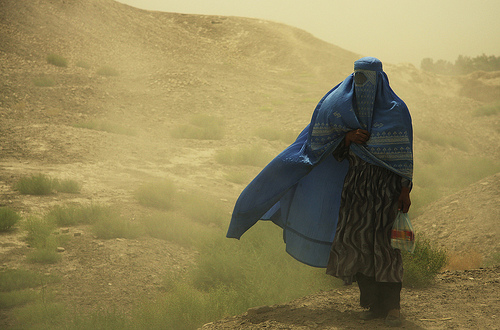 TIME– Fawzia felt like she had no way out. Married off to her cousin at age
16, she had been beaten routinely by her husband and in-laws in their
poor rural home in Paktia province for the first three years of her
marriage. She complained bitterly to her parents, but no solution seemed
imminent.
TIME– Fawzia felt like she had no way out. Married off to her cousin at age
16, she had been beaten routinely by her husband and in-laws in their
poor rural home in Paktia province for the first three years of her
marriage. She complained bitterly to her parents, but no solution seemed
imminent.
Marriage had become too much for her to bear. Then, after she saw her brother-in-law strike his wife on the head with a gun, Fawzia finally did what she had threatened to do many times before: she doused herself in cooking fuel and struck a match.
Now Fawzia (whose name has been changed because of her age) lies in a hospital bed with third-degree burns covering 35% of her body and ash coating the insides of her lungs. Her physician, Dr. Ahmed Shah Wazir, believes it’s unlikely that she will survive. The terrifying thing is that she is far from the only person in Afghanistan to take such drastic action.
The Ministry of Women’s Affairs has documented a total of 103 women who set themselves on fire between March 2009 and March 2010. No one knows what the real numbers are, given the difficulty of collecting data in the country. “More than 80% [who try to kill themselves in this way] cannot be saved,” says Wazir, who runs the burn unit at Kabul’s Istiqlal Hospital, one of only two such specialized wards in Afghanistan. (See pictures of Muslim women leading a soft revolution.)
Wazir believes that most of his would-be patients never make it to the hospital. In some cases, families are too ashamed or fearful of prosecution to report what happened. “There are many such cases where, because of honor, because of the media, [the families] don’t want to disclose it,” says Selay Ghaffar, director of the Kabul-based NGO Humanitarian Assistance for the Women and Children of Afghanistan (HAWCA). “I’m sure there are many, many cases that are still invisible.” “I have seen a number of instances of women setting themselves on fire in my life,” says Fawzia’s mother, wiping away tears. She insists that there is nothing unusual about her daughter. “Four months ago, someone else from our village lit herself on fire and died.”
In recent years, the dramatic suicide method employed by women in this war-torn country has drawn wide attention, amid speculation that the trend might be growing. Some, like Wazir, blame Iranian TV and cinema for romanticizing suicide by fire. (For example, in the 2002 movie Bemani, a girl uses self-immolation to escape a forced marriage.) He points out that many of his patients, including Fawzia, are refugees who have returned from Iran. Other observers argue that the practice has long existed as a method by which Afghan women try to escape their sorrows and that improved monitoring since the fall of the Taliban has only made it more prominent in public awareness. The Afghan government, however, says that in the past five years, the numbers have dropped.
Read full article about Afghan Women Self Immolation.
Photo by AfghanistanMatters Flickr User
© COPYRIGHT TIME, 2010










